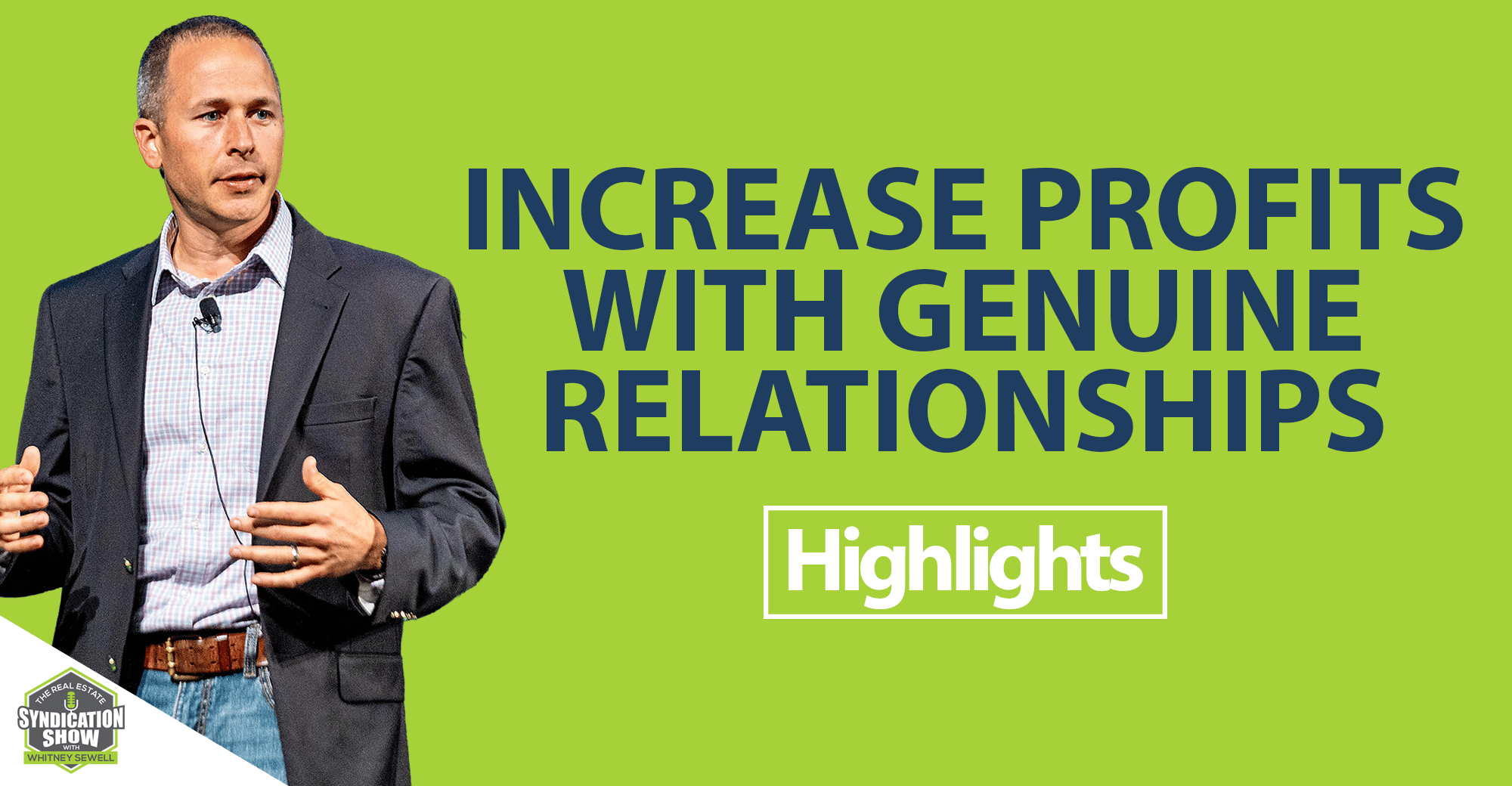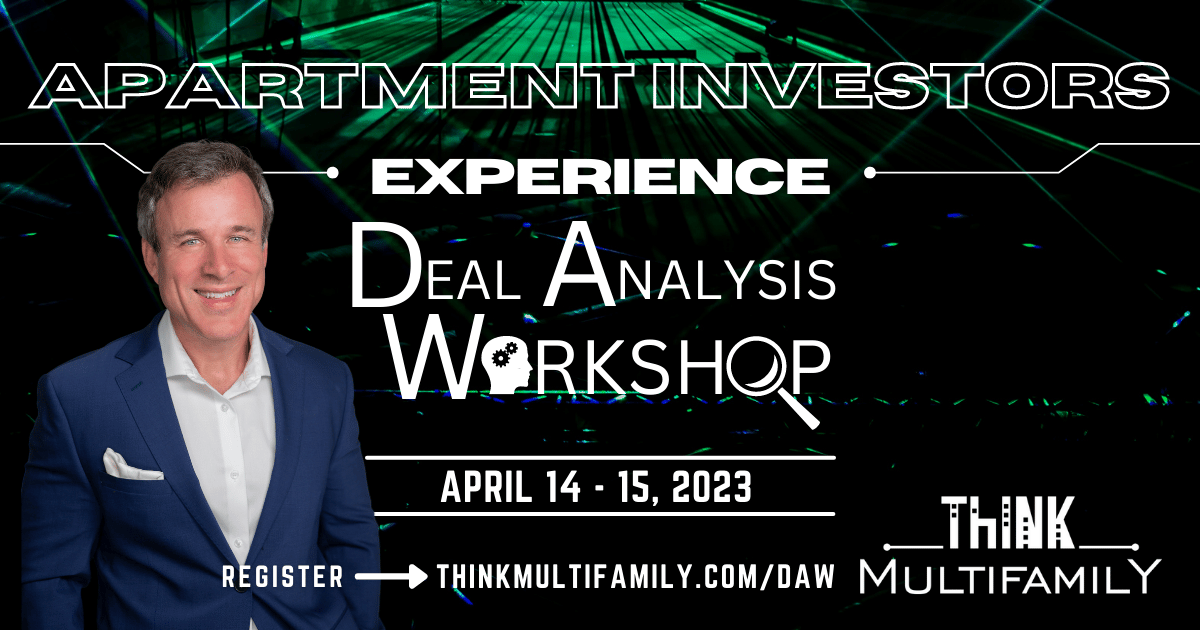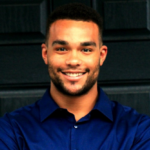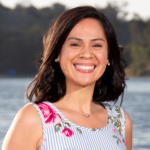
We’ve heard time and again that the real estate business is a people’s business. Thus, it is vital that when you are in this field, you have to hone and build relationships with different kinds of people. In this #Highlights episode, we look back at our conversations with real estate entrepreneurs Trevor West and Daisy Serrano. The two elaborate on how building genuine relationships can help increase your profits.
Our Gracious Sponsor:
DEAL ANALYSIS WORKSHOP

Deal Analysis. The #1 Critical Skill EVERY Multifamily Investor MUST know!
Want to take your investing career to the next level? Then check out Think Multifamily’s Deal Analysis Workshop.
For more information, go to www.ThinkMultifamily.com/daw.
Watch the episode here:
Listen to the podcast here:
Trevor explains how his foray into investing has provided him with opportunities to learn, grow, and form meaningful relationships, things he values even more highly than his finances. Meanwhile, Daisy shares she never imagined that she would become captivated by the opportunities in real estate, yet she found herself falling in love with the industry as she got more exposure. Click the play button now and start building genuine relationships in the industry today!
Key Points From This Episode:
- Trevor’s background, time in the Air Force, and how he found himself in the real estate game.
- The first deal that Trevor made and the learning that was required early on.
- The jump that Trevor made into syndication and why it suits his personality.
- Extreme self-discipline and ways that Trevor approaches going all-in.
- The two small practices that have helped Trevor keep moving forward!
- Daisy shares how she leverages her background in counseling and education in real estate.
- How she ‘accidentally’ fell in love with the industry, and multifamily in particular.
- Their mission of helping more millennials get access to investing in multifamily.
- How exactly do they help millennials to overcome the roadblocks of getting into this space?
- Daisy talks about their podcast and how it developed from their conversations with people.
- The steps millennials should take to familiarize themselves with the risks and opportunities.
- The importance of developing the skills to connect with people and build real relationships.
Tweet This!
“One of the things that always resonated with me is, you can read all the books and all the articles, but you’re not going to actually learn until you start doing.” – Trevor West
“Through syndication, it aligns so well with building a business that we can make last.” – Trevor West
“I think to understand that it’s not about the money, especially for newer syndicators, especially for those who don’t have a deal under their belt but it’s about the experience. It’s about getting in and building long-lasting relationships with people that you know, like, and trust.” – Trevor West
“In this industry, it’s all about people.” – Daisy Serrano
“I think my approach to life is that everybody has a very unique story, everybody’s gone through something different, and everybody has such lived experiences and wisdom, and truths that have come from those experiences.” – Daisy Serrano
Links Mentioned in Today’s Episode:
WS752: Positive Profits through Genuine Human Connection with Trevor West
Women’s Real Estate Network (WREN)
WS767: Creating A Genuine Relationship with Daisy Serrano
About Trevor West

Trevor West is a former Air Force Intelligence analyst who made the switch to real estate after learning how much control he actually had over his own life but wasn’t tapping into. After a sudden mindset shift, he used many of the principles and disciplines learned from the military to begin acquiring real estate. As a full-time real estate agent and investor, Trevor’s time is devoted to real estate and he has acquired nine multifamily units in less than a year. Leading into 2021, Trevor plans to acquire his first apartment complex through positivity, partnership, and a desire to create a life worth leading.
About Daisy Serrano

Daisy is a limited partner in 253 units in Texas (totaling $20.7MM in value) and is a leader with the Women’s Real Estate Network (WREN), as well as with Prospanica: The Association of Hispanic Professionals. She has over 10 years of experience in international relations, education management, and counseling. She has worked with clients in more than 25 countries and has thrived in supporting large organizational and governmental structures. Her goals are to help more people (especially millennials!) have opportunities to invest in real estate multifamily, uplift and empower her community through mentorship/access, be a positive role model for her family, and retire her parents.
Full Transcript
EPISODE 1568
[INTRODUCTION]
Whitney Sewell (WS): This is your daily Real Estate Syndication Show and I’m your host, Whitney Sewell. Today we have packed a few different shows together that we call Highlights to help you to get the most bang for your time and educating you on the topics that you want to learn from. We would love to hear from you. I am grateful that you are with us today. Have a blessed day.
[INTERVIEW]
WS: Our guest is Trevor West. Thanks for being on the show, Trevor.
Trevor West (TW): Thank you very much, Whitney. I’m very grateful to be here.
WS: Trevor is a former Air Force Special Operations Analyst who approaches real estate and life through desire, discipline and a positive attitude. He’s a firm believer in the magic of thinking big and is leaning forward in the apartment syndication space to put him and his team’s first apartment building under contract. His goal is to lead an extraordinary life and create generational wealth for himself and those around him through real estate syndication.
Trevor, thank you again. First off, thank you for your service. Always grateful for the men and women who are willing to volunteer to put their life in the line for our country and protect us. Thank you for that and also, thank you for just being on the show. I love your bio and the positive attitude. I think it’s so important. But let’s jump into that, give us a little about your background and your desire to get in this syndication business.
TW: Yeah, absolutely. Again, super grateful to be here. Thank you for inviting me on the show. As you mentioned, I joined the Air Force shortly after high school. I didn’t want to go to college so I went in. Originally, I want to do Special Forces, but being colorblind along some other things just kind of prevented me from doing that. The next step was, I want to do the next coolest thing, so I was intel analyst. Continuing with that mindset and that drive to be the best, I went and assessed for a special operations unit, where I spent the majority of my time in the air force working with special forces. Just to mention, [inaudible] was actually on this show prior to this and working through a lot of the challenges that come along with being in a high-stressed environment at a young age taught me that there’s more to life, and there’s more that I can do than being in the Air Force was amazing opportunity.
Going in with a mindset of, I’m going to do 20 years and then start my life. That just wasn’t in the cards for me. A lot of people say, when I retire or I’m after the 10-year mark, so I might as well just do 10 more. That just — I couldn’t jive with that type of thinking. I ended up joining the local Rugby team and on a catastrophic day, I end up snapping my leg. Being an extremely extroverted person, I’m always around people. I’m always positive and wanting to be around others. So when I broke my leg, my three roommates at the time who I always spend my time with, they ended up deploying. It was just me, alone with thoughts, burning through Netflix and then I just had an insane and super grateful for having extreme mindset shift. I was like, I really got to start figuring this out for myself.
I started with financial intelligence, building my financial IQ that quickly turned into personal development. Then just like so many others, Rich Dad Poor Dad was a book that I read and it’s just like. “Whoop, real estate is exactly where I want to be.” As I mentioned before, I didn’t want to go to college. I wanted to build something for myself, so I started just learning, and burning through books, learning as much as I could. Then the next thing everyone always talks about is action. You have to put it to action.
Three months later, I went out and bought my first property, a triplex. Ever since then, I’ve just seen the power that’s behind real estate and what it can really do for your life. Money is not the cause, it’s the result and it’s a tool that can promote a certain type of lifestyle, not just for yourself and family but for others around you. This is exactly why apartment syndication was the next step for us.
WS: Nice. I’m grateful for that, just showing us how you got to where you’re at now. It’s obviously the military mindset. I talk about that a lot just so when I’m speaking somewhere about how the military just gave me that never give up mindset. I love how you talk about that.
Placing you in high-stress environments at a young age and how that taught you so much, and I can relate to that as well. You couldn’t see doing that for 20 years, so you started looking. What else can I make more for myself or of myself? But the incident breaking your leg, man, it made your roommates take a different route than you did, right? They were deployed and so you found some time on your hands.
Three months so after just learning, putting it into action, you had your first property. Give us a few details about that property, then I want to jump into why you want to move into the syndication space as well. But three months into that first deal, how did you do that?
TW: Yeah, absolutely. Just learning as much as I could. One of the things that always resonated with me is, you can read all the books and all the articles, but you’re not going to actually learn until you start doing. Being in the military, action is, if you’re not taking action, something is wrong. If you’re not taking action, someone could potentially get hurt.
I went out, military VA loan, I was just — as we mentioned before we started the podcast is, I’m located just south of Raleigh and I was bound and determined to find a property in Raleigh because some market was just insane. But I quickly realized after walking 15, 20 properties, I wasn’t going to make any money. I started looking in other markets down in Fayetteville, and surrounding submarkets there. I found a triplex that have been converted to a triplex and two different houses. The seller was an ordered guy, trying to liquidate, trying to just go and travel with his wife. It’s been on the market for about 550 days. It was in a more rural pocket of the submarket of Fayetteville, but I was like, “This looks like it could be a good opportunity based on what I’ve already winded up running the numbers.
I went in, and negotiated a price at the 1% rule, if some of the listeners are familiar with that. The VA came in and did their appraisal. They couldn’t find any multifamily properties in the area, which significantly dropped the appraisal price, which the seller agreed and fixed all the property, fixed all the required repairs and I walked into a cash-flowing property, and I actually deployed.
One of the biggest lessons I learned from that property is, never let the seller manager your property after you’re gone. Because what had happened was, he had already a preexisting relationship with the tenant on a good old voice system of, “Hey, don’t worry about this month. You can pay me later” then that just fired into a number of different problems because he shut off the utilities for that tenant, and they were struggling with a brand-new baby. I guess, one of the main lessons that I like to transfer from that property to apartment syndication is, management is key. Having a stellar property manager can make or break a deal, because at that time I was losing money because he was letting people slip on their payments and things of that nature.
WS: Nice. Now that you’ve done the triplex and now you’re learning about the syndication business, why syndication? Why not keep growing a smaller multifamily like you’re doing?
TW: From like economic aside, apartment syndication just aligns with who I am as a person. When I first got into the personal development side of things, I read a book called Black Hole Focus. The premise of the book is how intelligent people can create a powerful purpose for their life. It runs you through all these different exercises about setting your core values, and who you are as a person. For me, it was consistency, long-term self-respect, achievement, influence, and living my happiest life.
Apartment syndication really is all those things. I get influenced because I’m raising capital through investors. I am achieving this because once we get our first deal under our belt, then that just compounds into the next thing and it’s just a win-win for everybody. Being that positive person that I choose to be, I win, my investor wins, and the community wins because they get safe and affordable housing. It really is something that you can just create. Why our goal? We’ll probably talk about it in a minute. But surrounding myself with a positive team.
A lot of the syndicators I see are just doing it on their own, and that’s awesome and I can so respect that. But my two partners can kind of spread the responsibility out a little bit. So now, we are working together towards one common goal. Through syndication, it aligns so well with building a business that we can make last. We don’t have to go out and buy 50 duplexes to reach our 100-unit goal. We can go buy a 30 unit, and then an 80 unit, and then a hundred plus. It’s something that creates that true generational wealth.
When you get into real estate at first, everyone talks about generational wealth, this is how it starts. Yes, that’s where it starts but it doesn’t have to stay at a duplex and triplex. You can absolutely build upon that and it creates something that is truly going to last past the days that I’m on this planet.
WS: What’s a way that you’ve recently improved your business that we can apply to our business?
TW: It’s definitely that team mentality. Because of the syndicators that I’ve been talking to, especially new ones, the ones who are excelling have a number of team members that they’re working with. The ones who are, “This is crazy. I have so much to do. I still have to handle my regular life and build this business all at the same time” are the ones who are trying to do it solo.
I think to understand that it’s not about the money, especially for newer syndicators, especially for those who don’t have a deal under their belt, it’s not about the money as I mentioned earlier, but it’s about the experience. It’s about getting in and building long-lasting relationships with people that you know, like, and trust. That is going to be the difference between somebody who is struggling to get that next deal, struggling to put their first deal on their contract versus the people who are leveraging out their time and leveraging out other people’s expertise.
[INTERVIEW 2]
WS: Our guest is Daisy Serrano. Thanks for being on the show, Daisy.
Daisy Serrano (DS): Hi, Whitney. Thank you so much for having me. Excited about today.
WS: I know you have your superpower like connecting with people, learning about people. Let’s talk about that a little bit because it’s so important in this business. It’s a skill that I had to work on, read books about and practice, just to learn how to connect with people and learn about them, right? I’d love for you to just elaborate on that a little bit, and maybe we can talk through some example or anything like that.
DS: Yeah, definitely happy to. Even in thinking, what is my superpower? I thought, “Oh, what should I say?” I was thinking, I need to say something that’s more business-related, right? Because it is a business essentially.
The more I thought about it, the more I said, “No, I know who I am and you know who I am as a person is someone who loves connecting with people, and somebody who loves learning people’s stories.” The best way to sort of faith it is, one time a friend told me, “You’re a great networker,” and I said, “Oh, I never thought of myself as a networker.” But now, thinking back it’s yeah, somebody who networks is somebody who loves learning about people and creating a genuine relationship.
As you mentioned, Whitney, in this industry, it’s all about people, right? Whether it is your clients, the tenants, the residents that lived in the properties, in multifamily or whether it’s the partners that you’re working with, whether it’s the investors. It’s all about people. For me, it’s was really, once I realized that, it is a business of people and it is those connections that get you the furthest. Then I fully jump in because I felt like there was a gap in my experience, coming from a very different world.
What I realized is that my experience fit so well into multifamily because of that love for genuine connection with people. What that looks like now is webinars, events, and meetups. For me, it’s very easy to walk into a room and go up to a stranger and talk and ask questions. In a way, that’s very genuine.
WS: So many people are so fearful. I mean, so many people are so fearful of that, just walking and talking to somebody they don’t know. I would say, that’s something — I mean, I’ve had a lot it practiced with over many years now. But initially, it’s not easy, right?
DS: Yeah. A good example to your point, Whitney, is, when I decided and I committed to taking real estate seriously, I joined the Women’s Real Estate Network that you mentioned. I’m on the leadership team for now. I didn’t know anybody there, right? My industry was completely different, so I found this group on meetup and I just showed up. It was such an amazing experience because I showed up and I was there to learn, and I was just so excited to be there. So, it was a very easy transition, right, to be able to walk into a room and not knowing a lot about — not being able to talk about cap rate or NOI or like not having the terminology down at that point, but understanding that I was interested in being there and being able to have those conversations.
I walked away from that meeting with about four phone numbers. I signed up for the membership right then and there, and I signed up to volunteer with the organization. That really led me in this trajectory where I just became so involved with the organization that now I’m on the leadership team, but it really started with just showing up, being very comfortable with walking up to people, and asking questions, and just chatting and wanting to know them better. That’s really — that was where it started for me.
WS: Wanting to know them better. If you just think like that, there are a lot of questions that come to mind or conversation starters, right, that you can ask someone. I think that’s hard initially because you don’t know what you’re going to say, or if you have — when people are so nervous about that, you may fumble over your words quite a bit or something. You’re worried about that, but if you are focused on learning about the, it’s a lot easier, isn’t it?
DS: It is and it’s beautiful. I mean, I think my approach to life is that everybody has a very unique story, everybody’s gone through something different, and everybody has such lived experiences and wisdom, and truths that have come from those experiences.
For me, it’s really whether I’m out of Metro Station in LA and just sit next to a stranger, it’s just really learning who they are. I think that’s really my approach too to life and to real estate. It’s just wanting to learn who people are. Sometimes there are better connections, and sometimes there aren’t as good connections, right? I mean, we’re very different and so you don’t connect with everybody necessarily. But I think once you build your tribe and the people that you resonate with and your values aligned, then there’s so much power in that, and you might lose that opportunity if you don’t start that conversation.
[END OF INTERVIEW]
[OUTRO]
Whitney Sewell: Thank you for being with us again today. I hope that you have learned a lot from the show. Don’t forget to like and subscribe. I hope you’re telling your friends about Real Estate Syndication Show and how they can also build wealth in real estate. You can also go to LifeBridgeCapital.com and start investing today.
[END]
Love the show? Subscribe, rate, review, and share!
Join the Real Estate Syndication Show Community:




